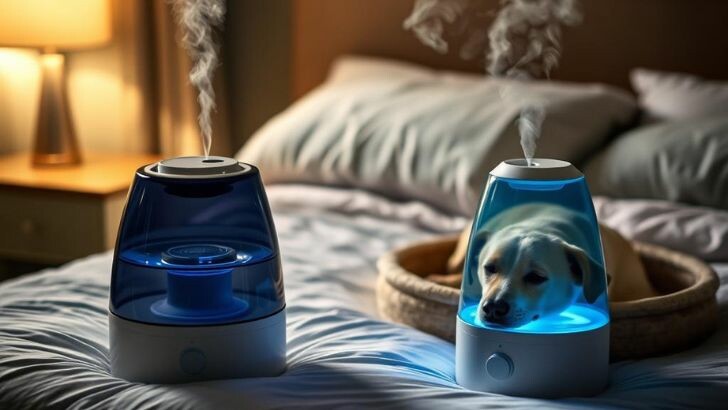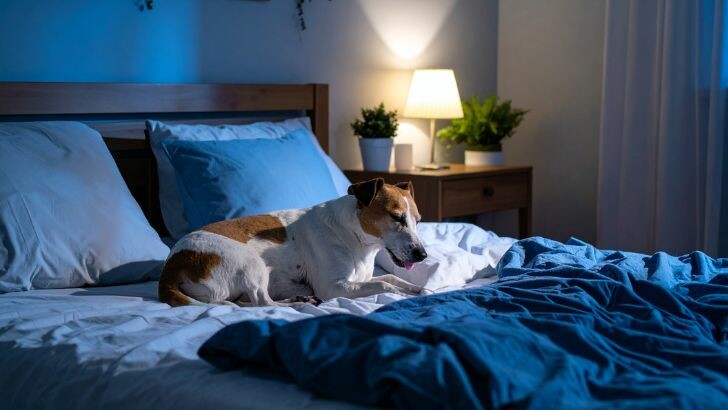Understanding Dog Coughing at Night: What Every Pet Owner Should Know
Hearing your dog cough in the middle of the night can be unsettling. Unlike the occasional daytime cough that may pass unnoticed, dog coughing at night often feels more alarming because it interrupts sleep and seems more persistent. For pet owners, it’s natural to wonder whether this symptom is a minor irritation or a sign of a serious condition. The truth lies somewhere in between: while some causes are relatively harmless, others require urgent veterinary attention.
This article explores the most common reasons dogs cough at night, the associated risks, how veterinarians approach diagnosis, and what you can do at home to support your pet’s health.
See more: https://petpettypaw.com/dog-coughing-at-night/
Why Dogs Cough More at Night
Coughing is the body’s way of clearing irritants or fluid from the respiratory tract. However, dogs often experience stronger symptoms during nighttime hours. When lying down, fluids in the lungs or airways may shift, irritants can accumulate, and pressure on the chest changes, all of which make coughing more noticeable. Nighttime is also quieter, so what might be minor during the day can sound more disruptive after dark.


Common Causes of Nighttime Coughing
1. Heart Conditions
One of the most serious reasons behind dog coughing at night is heart disease, particularly congestive heart failure. When the heart struggles to pump efficiently, fluid builds up around the lungs. This congestion is often more noticeable when your dog is resting. Dogs with heart disease may also show other warning signs such as fatigue, difficulty exercising, rapid breathing, or even fainting spells.
2. Collapsed Trachea
Small breeds like Toy Poodles, Pomeranians, and Yorkshire Terriers are especially prone to tracheal collapse. This condition occurs when the airway loses strength and partially collapses, leading to a distinctive “goose honk” cough. Because the airway narrows further when a dog is lying down, the coughing tends to worsen at night.
3. Respiratory Infections
Illnesses such as kennel cough, bronchitis, and pneumonia are well-known for causing nighttime coughing. These infections inflame the airway and produce mucus that builds up when the dog is inactive. A dog with a respiratory infection may not only cough during the night but also show fever, loss of appetite, or nasal discharge.
4. Allergies and Environmental Irritants
Bedrooms can harbor allergens such as dust mites, mold, or smoke. When a dog spends hours in this environment overnight, the irritants can trigger frequent coughing episodes. Dogs with allergies may also scratch more, sneeze, or develop watery eyes.
5. Parasites
Heartworms and lungworms are serious parasites that often lead to chronic respiratory problems in dogs. Infected pets may show signs such as weight loss, reduced stamina, and dog coughing only at night, which can easily be overlooked until the condition worsens. Because heartworm disease can be life-threatening if left untreated, maintaining a strict schedule of regular parasite prevention is one of the most effective ways to protect your dog’s long-term health.
6. Other Possible Causes
-
Acid reflux or gastroesophageal reflux disease (GERD).
-
Foreign objects lodged in the throat.
-
Laryngeal paralysis in older dogs.
-
Reverse sneezing, which is sometimes mistaken for coughing.
When Is Dog Coughing at Night a Red Flag?
Not every cough requires an emergency trip to the vet, but certain signs should never be ignored:
-
Difficulty breathing or noisy breathing.
-
Gums or tongue turning bluish or pale.
-
Continuous coughing fits that prevent your dog from resting.
-
Coughing up blood or pink froth.
-
Collapse, extreme lethargy, or loss of consciousness.
If you notice any of these symptoms, seek veterinary care immediately. They could indicate advanced heart disease, pneumonia, or other life-threatening conditions.

How Veterinarians Diagnose Nighttime Coughing
Because so many conditions can cause dog coughing at night, proper diagnosis is crucial. A veterinarian will typically:
-
Ask for a detailed history: When does the coughing occur? Has it worsened over time? Are there other symptoms?
-
Perform a physical exam: Listening to the chest with a stethoscope, checking gum color, and gently pressing on the trachea.
-
Order diagnostic tests such as:
-
Chest X-rays to evaluate heart size, lung condition, or tracheal collapse.
-
Echocardiogram (ultrasound of the heart) if heart disease is suspected.
-
Blood tests to detect infection or organ problems.
-
Heartworm tests in areas where the parasite is common.
-
Endoscopy or bronchoscopy for complicated airway issues.
Only by identifying the exact cause can a veterinarian recommend effective treatment.
Treatment Options
The treatment plan will vary depending on the underlying issue:
-
Heart disease: Medications such as diuretics to remove fluid, drugs to improve heart function, and lifestyle changes including reduced salt intake.
-
Collapsed trachea: Weight control, switching from a collar to a harness, cough suppressants, or surgery in severe cases.
-
Respiratory infections: Antibiotics, anti-inflammatory drugs, and supportive care such as rest and hydration.
-
Allergies: Removing the allergen from the environment, using air purifiers, washing bedding, and possibly antihistamines or inhaled medications.
-
Parasites: Specific deworming treatments along with ongoing preventive medication.
-
Acid reflux: Feeding smaller meals, avoiding late-night feeding, and medications that reduce stomach acid.
It’s important to avoid giving your dog over-the-counter human medications without veterinary approval. Some common cough medicines contain ingredients that are toxic to dogs.
Home Care Tips for a Coughing Dog
While treatment should be guided by a veterinarian, supportive care at home can help your dog rest more comfortably:
-
Create a clean sleep environment: Wash bedding often, vacuum regularly, and reduce dust or smoke in the bedroom.
-
Elevate your dog’s sleeping position: A slightly raised head can reduce coughing caused by fluid buildup or reflux.
-
Use a humidifier: Moist air helps soothe inflamed airways.
-
Maintain healthy weight: Excess weight makes breathing harder and worsens conditions like tracheal collapse.
-
Switch to a harness: This prevents extra pressure on the throat.
-
Keep a cough diary: Record when coughing happens, how long it lasts, and what triggers it.
Preventing Nighttime Coughing
Although not every cause can be prevented, you can reduce risks significantly with a few proactive steps:
-
Keep vaccinations up to date, including those for kennel cough.
-
Provide monthly parasite prevention for heartworm and lungworm.
-
Schedule annual veterinary check-ups, especially for senior dogs or breeds prone to respiratory issues.
-
Ensure a clean, smoke-free household.
-
Train your dog to walk on a harness rather than pulling on a collar.
Frequently Asked Questions
Q: Why does my dog cough more when lying down?
A: Lying down changes pressure in the chest and allows fluids or mucus to shift, making coughs more noticeable at night.
Q: Can allergies really cause nighttime coughing?
A: Yes. Dust, mold, and smoke often accumulate indoors, especially in bedrooms. This can trigger coughing spells after hours of exposure.
Q: My small dog makes a honking sound when coughing. What does it mean?
A: This “goose honk” cough is typical of collapsed trachea, especially in small breeds, though other conditions can mimic it.
Q: Should I worry if my dog only coughs occasionally at night?
A: Occasional coughing may not be serious, but if it becomes frequent or severe, or if other symptoms appear, consult your vet.
Q: What’s the most dangerous cause of nighttime coughing?
A: Heartworm disease and heart failure are among the most dangerous because they can be life-threatening if untreated.
Conclusion
Dog dry coughing at night is not an issue that should be ignored. While occasional episodes may stem from minor irritants or short-term infections, persistent or recurring coughs can also signal more serious problems such as heart disease, airway collapse, or parasitic infestations. Since the possible causes vary widely in severity, the most responsible step for any pet owner is to have their dog thoroughly examined by a veterinarian to ensure timely diagnosis and proper treatment.
With timely medical care, environmental adjustments, and preventive measures like vaccinations and parasite control, you can protect your dog’s health and restore peaceful nights for both of you. Remember: your dog’s nighttime cough is not just a sound—it’s a signal. Listening to it and taking action could make all the difference in your pet’s well-being.

